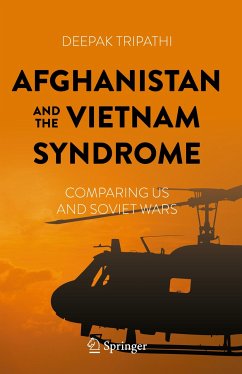Great powers have often found that military adventurism to force their will in distant lands comes with the risk of spending excessive military, economic, and moral capital to the extent that war is no longer sustainable. Written by a former BBC Afghanistan correspondent who set up the corporation's bureau in Kabul in the early 1990s, this book draws both from scholarly knowledge as well as first-hand insights on how the Americans met that fate in Vietnam, and the Soviets and Americans in Afghanistan. America's 1975 retreat from Vietnam was a consequential event, prompting US commentators to explain it as reluctance to get involved in foreign wars, a mindset described as the Vietnam Syndrome. As Deepak Tripathi points out, the Vietnam experience made the Americans determined to give the Soviets their own Vietnam. The 1979 Soviet invasion of Afghanistan, and retreat after a decade of occupation, represented the revenge America sought. However, President George W. Bush's decision to invade Afghanistan after the 9/11 attacks was the beginning of a long military venture that ended in retreat in 2021. Addressing an academic as well as a general audience, Tripathi explores parallels between wars in Afghanistan and Vietnam, and shows how the United States and the Soviet Union met the same fate.
"Anyone with an interest in world affairs should read Deepak Tripathi's superb book Afghanistan and the Vietnam Syndrome."
Richard Falk, Milbank Professor of International Law Emeritus, Princeton University, and Chair of Global Law, Queen Mary University of London
"Combining the sharp judgments of an experienced foreign correspondent with the insights of the trained historian, Deepak Tripathi has produced an informed, insightful and wide-ranging study that helps us make sense of the challenges that both the Soviet Union and the United States encountered in Afghanistan's mountains and on Afghanistan's plains. No one will fail to benefit from reading it."
William Maley, Emeritus Professor of Diplomacy, Australian National UniversityDieser Download kann aus rechtlichen Gründen nur mit Rechnungsadresse in A, B, BG, CY, CZ, D, DK, EW, E, FIN, F, GR, HR, H, IRL, I, LT, L, LR, M, NL, PL, P, R, S, SLO, SK ausgeliefert werden.
Es gelten unsere Allgemeinen Geschäftsbedingungen: www.buecher.de/agb
Impressum
www.buecher.de ist ein Internetauftritt der buecher.de internetstores GmbH
Geschäftsführung: Monica Sawhney | Roland Kölbl | Günter Hilger
Sitz der Gesellschaft: Batheyer Straße 115 - 117, 58099 Hagen
Postanschrift: Bürgermeister-Wegele-Str. 12, 86167 Augsburg
Amtsgericht Hagen HRB 13257
Steuernummer: 321/5800/1497
USt-IdNr: DE450055826
Bitte wählen Sie Ihr Anliegen aus.
Rechnungen
Retourenschein anfordern
Bestellstatus
Storno









